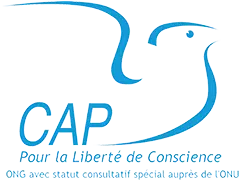
CAP Liberté de conscience (09.12.2024) — On December 2, 2024, the Marseille Magistrates’ Court ordered UNADFI (Union Nationale des Associations de Défense des Familles et de l’Individu) to publish a right of reply from CAP Liberté de Conscience on its website within 48 hours, subject to a penalty of 50 euros per day of delay. UNADFI had argued that its status as an organization of public utility meant that the law did not apply to it but the judge ruled that UNADFI was not above the law.
After UNADFI published an article on its website targeting the association CAP Liberté de Conscience, the latter sent a right of reply to its President Catherine Katz for publication. In the absence of a response from UNADFI, CAP Liberté de Conscience took the case to the Marseille Court of Justice, seeking forced publication.

Marseilles Law Courts (credits)
In its right of reply, CAP Liberté de Conscience re-established the truth about its activities:
“… CAP Liberté de Conscience is an independent and secular organization. It has Consultative Status with the United Nations and defends freedom of conscience in Europe and internationally. It is recognized for its expertise in its field throughout the world. It has been in operation for almost 30 years.
Concerning the movements defended by CAP Liberté de Conscience when their fundamental rights are threatened, information is easily available online. In the last two years alone,CAP Liberté de Conscience has carried out numerous actions to defend the rights of Uighurs persecuted by the Chinese government, those of Ethiopian Orthodox communities, women’s rights in Saudi Arabia, freedom of conscience in the Russian Federation, the rights of minorities in Baluchistan (Pakistan), the rights of Ahmadi Muslims persecuted in Pakistan, the rights of numerous prisoners of conscience in many countries, including Ukrainians threatened with deportation to Russia for their opinions, actions against the death penalty for apostasy which still exists in 13 countries, and dozens of others…”.
Facing the judge, UNADFI defended itself by pointing to its public utility status, which in its view was an obstacle to the application of the law on the right of reply, and that “it was therefore impossible for UNADFI to publish an article (…) by the association CAP Liberté de Conscience on a website dedicated to the victims of acts punishable by criminal law, to whom the State has been unable to provide sufficient protection”.
For Thierry Valle, President of CAP Liberté de Conscience: “This conviction sends a clear message to UNADFI: it is not above the law. In the end, its defense consisted of saying that if it had to comply with the law, it would no longer be able to work, and it was asking the judge to give it a blank check, a free pass to continue to act outside the legal framework. The judge rightly applied the law and helped bring UNADFI back to reality: the law applies to everyone, and even associations opposed to religious diversity must respect it.”
UNADFI also complained that it could only rely “on state subsidies which, in view of budget restrictions, are not increasing…”. It should be noted that nearly 90% of UNADFI’s annual income comes from our taxes, and that this represents several hundred thousand euros a year for an association with just four employees.
Finally, UNADFI also complained that “recently, the association CAP Liberté de Conscience felt it had to lodge a criminal complaint against UNADFI with the National Financial Prosecutor’s Office”. It fails however to mention that in addition to the preliminary investigation opened by the National Financial Prosecutor’s Office following the complaint of CAP Liberté de Conscience, the subsidies distributed by MIVILUDES (including those paid to UNADFI) are currently the subject of a referral from the Public Prosecutor of the French Court of Auditors to the Litigation Division which, according to the President of the Court of Auditors, Pierre Moscovici, will now investigate “and possibly judge and condemn whoever is involved‘, for a case he considers a serious matter”.
Enclosure: Decision of December 2, 2024 by the Marseille Court of Justice
Source: CAP Liberté de Coscience





